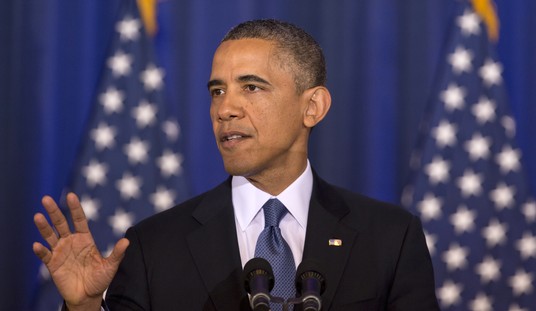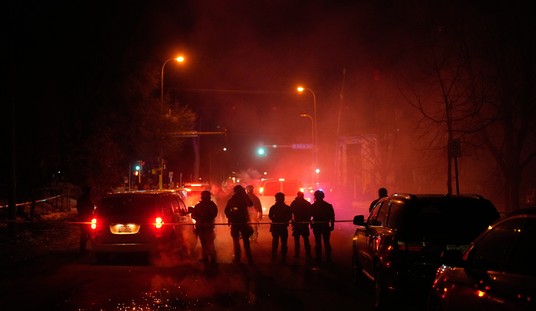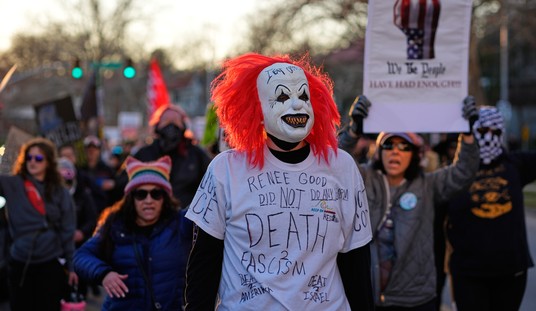Who wasn’t moved and inspired by this week’s displays of civil disobedience by World War II veterans in Washington, D.C.?
Perhaps we were abashed as well.
Who among us can honestly say we’d have done what they did — defying authority, risking arrest, making a scene — even though we are, most of us, younger and stronger?
Aren’t millions of Americans rather more like this fellow, spotted by Mark Steyn in his travels:
I saw a fellow in a “Don’t Tread on Me” T-shirt the other day. He was at LaGuardia, and he was being trod all over, by the obergropinfuhrers of the TSA, who had decided to subject him to one of their enhanced pat-downs.
There are few sights more dismal than that of a law-abiding citizen having his genitalia pawed by state commissars, but having them pawed while wearing a “Don’t Tread on Me” T-shirt is certainly one of them.
https://www.youtube.com/watch?v=Wccme7zJMYk
This isn’t the first time America’s veterans have publicly defied governmental and bureaucratic idiocy — and no, I’m not talking about the so-called “Vietnam Veterans Against the War,” some of whom were imposters and many more of whom were Maoists.
Look at the stirring example of the Bonus Army:
In 1924, a grateful Congress voted to give a bonus to World War I veterans – $1.25 for each day served overseas, $1.00 for each day served in the States. The catch was that payment would not be made until 1945.
However, by 1932 the nation had slipped into the dark days of the Depression and the unemployed veterans wanted their money immediately.
In May of that year, some 15,000 veterans, many unemployed and destitute, descended on Washington, D.C. to demand immediate payment of their bonus. They proclaimed themselves the Bonus Expeditionary Force but the public dubbed them the “Bonus Army.” Raising ramshackle camps at various places around the city, they waited. (…)
[O]n July 28, Attorney General Mitchell ordered the evacuation of the veterans from all government property, Entrusted with the job, the Washington police met with resistance, shots were fired and two marchers killed. Learning of the shooting at lunch, President Hoover ordered the army to clear out the veterans. (…)
By 4:45 P.M. the troops were massed on Pennsylvania Ave. below the Capitol. Thousands of Civil Service employees spilled out of work and lined the streets to watch. The veterans, assuming the military display was in their honor, cheered. Suddenly Patton’s troopers turned and charged. “Shame, Shame” the spectators cried. Soldiers with fixed bayonets followed, hurling tear gas into the crowd.
By nightfall the BEF had retreated across the Anacostia River where Hoover ordered MacArthur to stop. Ignoring the command, the general led his infantry to the main camp. By early morning the 10,000 inhabitants were routed and the camp in flames. Two babies died and nearby hospitals overwhelmed with casualties. Eisenhower later wrote, “the whole scene was pitiful. The veterans were ragged, ill-fed, and felt themselves badly abused. To suddenly see the whole encampment going up in flames just added to the pity.”
Four years later, the veterans were finally issued their bonuses.
The shameful treatment of the Bonus Army by Hoover and Roosevelt (not to mention Generals MacArthur and Patton) was a devastating fiasco.
However, the passage of the GI Bill in 1944 may not have happened without it.
The so-called “Battle of Athens” is even more obscure than the Bonus Army protests.
Veterans returning to McMinn County, Tennessee, in 1946 found that in their absence, a powerful cadre had established a suffocating small town dictatorship a la Walking Tall.
Democratic sheriff Paul Cantrell ran the town as his personal fiefdom, bullying and extorting the townspeople when he wasn’t fixing elections.
Cantrell and his deputies treated local veterans with particular contempt.
There were several beer joints and honky-tonks around Athens; we were pretty wild; we started having trouble with the law enforcement at that time because they started making a habit of picking up GIs and fining them heavily for most anything—they were kind of making a racket out of it.
The veterans formed their own political party to challenge Cantrell — now a state senator — and his gang.
Tensions ran high on election day, as accusations of voter fraud quickly mounted.
An elderly black resident was shot in the back after trying to vote, while GIs were taken hostage at polling stations by deputies.
In response, a veteran of the Pacific theater, Bill White, rounded up about a dozen others. They broke into the armory, secured weapons, then assembled outside the jail, where Cantrell was privately “counting the ballots” (in violation of state law).
Accounts vary about who fired the first shot. What isn’t disputed is that the veterans followed up their initial gunshots with dynamite and Molotov cocktails.
Miraculously, no one was killed during the standoff.
When the dust settled and votes were (legally) counted, five veterans were elected to office, helping to loosen their corrupt opponents’ iron grip on the town.
Eleanor Roosevelt wrote soon afterward:
We in the U.S.A., who have long boasted that, in our political life, freedom in the use of the secret ballot made it possible for us to register the will of the people without the use of force, have had a rude awakening as we read of conditions in McMinn County, Tennessee (…)
In this particular case, a group of young veterans organized to oust the local machine and elect their own slate in the primary. We may deplore the use of force but we must also recognize the lesson which this incident points for us all. When the majority of the people know what they want, they will obtain it.
The decisive action which has just occurred in our midst is a warning, and one which we cannot afford to overlook.











Join the conversation as a VIP Member